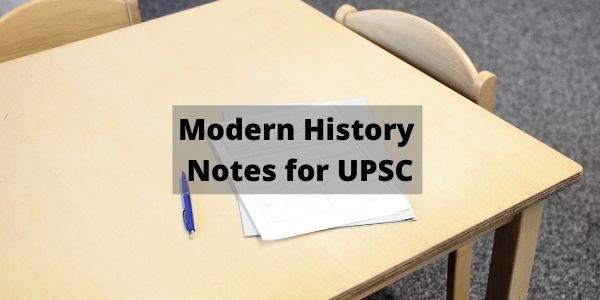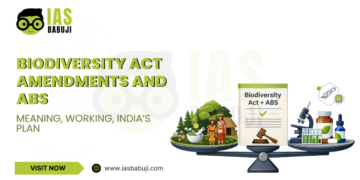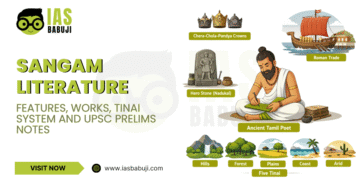To cover the entire syllabus of the IAS exam, a proper plan and making notes are essential. In this article, we have added details of the Modern History Notes for the UPSC exam. You will find details like modern India history notes. It will help you with the UPSC Exam preparations.
- Introduction
- Modern History of India
- Continued part of Modern History India Notes for UPSC
- How to study Modern India for the UPSC Exam Preparations
- Books to study Modern History UPSC
- Conclusion – Modern India History Notes for UPSC
- FAQs – Modern History Notes for UPSC
- Editor's Note | Modern History Notes for UPSC

Introduction
If you are already aware of the IAS exam syllabus, it is vast, and all need to complete it for the best results. Further, talking about the exam procedure, you have to write the prelims exam, the main exam, and once you clear the main exam, you are required to give the interview round. In the prelims, you will find the objective type, and in the main exam, questions will be descriptive type. Later, one can visit the official website for more details on the IAS exam and the UPSC. Click Here. Besides, one can join classes for the IAS exam. There are many classes in various cities. It depends on one person to the other. However, the success rate depends only on your hard work and dedication.
Modern History of India
Below we have added some of the notes that will help you with the exam preparations. Of course, one needs to make essential points while studying for the exam. We have some of the important points; however, you have to cover the complete syllabus for the exam.
Ancient India
- In the first place, Indian History is a topic of interest to many including foreigners. As it includes of the cultures and civilizations existed in this sub-continent.
- Further, the first inhabitants of Indian subcontinent like Nagas (North-East), Santhals (East-India), Bhils (Central India), Gonds (Central India), Todas (South India) etc.
- Besides, it can be studied under heads like Paleolithic, Mesolithic, Neolithic and Chalcolithic period
Indus Valley Civilization
Some of the features of the Indus Valley Civilization (BC. 2700- BC.1900, i.e., for 800 years.)
- It is the first civilization in South Asia, that spreads across a vast area of land in present, day the India and Pakistan (12 lakh sq.km).
- Then, the time period of the mature Indus Valley Civilization is around between (BC. 2700- BC.1900 ie. around 800 years).
- It is also known as Also known as Harappan Civilization. Harappan Sites discovered by the Dayaram Sahni (1921) – Montgomery district, Punjab, Pakistan.
- Later, the city was divided into Citadel(west) and Lower Town(east).
Medieval India
- There are many dynasties that are emerged as 7th century.
- By the end of the century there were big landlords or warrior chiefs in different regions of the subcontinent.
- In every states, resources were obtained from the producers, that is, peasants, cattle-keepers, who were often compelled to surrender part of what they created.
- Rashtrakutas in the Deccan is one such instance. Starrting they were subordinate to the Chalukyas of Karnataka.

Continued part of Modern History India Notes for UPSC
In Medieval India has a topic called “Rulers and Buildings – Medieval India.” Some of the essential points are
- From the 8th and the 18th centuries, kings and their officers built two kinds of structures: First were forts, palaces, and tombs. Second were structures meant for public activity consisting of temples, mosques, tanks, wells, bazaars.
- Further, the Construction activity was also carried out by others, including merchants. However, domestic architecture – large mansions of merchants – has survived only from the eighteenth century.
- Monuments provide an insight into the technologies used for construction.
- Further, talking about the building temples, tanks, and Mosques. Besides, the Rajarajeshvara temple was built by King Rajarajadeva for the worship of his god that is Rajarajeshvaram.
- Lastly, Muslim Sultans and Padshahs did not claim to be incarnations of god, but Persian court chronicles described the Sultan as “Shadow of God”.
How to study Modern India for the UPSC Exam Preparations
Now you have understood all the information related to the Modern History Notes for UPSC. Now, below we have added some tips that will help you with the exam preparations.
- In the first place, understanding the exam syllabus is the most essential in any exam. For this purpose, one can refer to the previous year’s papers, and it will help you in many ways.
- Further, you can classify the topic into Ancient History, Medieval History, and Modern History. Further, each part of the History is essential for the UPSC exam.
- Besides, questions are asked from the modern History in the prelims paper for the IAS exam. One can give mock tests that will make you familiar with the exam pattern and syllabus.
- As we all know, making notes is important. So, whenever you study from the textbooks, try to write down the important points, and it will help you during the exam. Further, if you want details on the IAS exam syllabus, pattern, books, tips, and other details. Read More.
- Later, revision is the most important thing in the UPSC exam preparation. So, whenever you complete a certain amount of the topic before starting the new concept. Try to cover the previous concepts.
- Studying from the best books is essential for the exam. So, understand which are the best books and try to study from them and try to make points while studying.

Books to study Modern History UPSC
It is the vast syllabus. So, one needs to study from the best books, and it will help you get the best results in the exam.
- Indian Art and Culture – by Nitin Singhania
- Modern India: – History Of Modern India by Bipan Chandra.
- Ancient and Medieval India – by Poonam Dalal Dahiya
- Ancient India: – History of Ancient and Early Medieval India by Upinder Singh
- Modern Indian History – by Sonali Bansal and Snehil Tripathi
- Modern India: – A Brief History of Modern India by Rajiv Ahir
- Ancient India: India’s Ancient Past by R.S. Sharma
NCERT Books
As we all know, NCERT books are essential for UPSC exam preparations. As they are easy to understand and they cover the complete syllabus. One must start preparations for the exam from the NCERT books. Therefore, it is important to study 6th to 12th standard NCERT books. Therefore, below we have added the list of NCERT books.
- C.R. Formula or Rajaji Formula of 1944 – Bal Gangadhar Tilak
- Bardoli Satyagraha – Charter Act of 1833
- Gandhi-Irwin Pact – Government of India Act 1858
- India’s Struggle for Independence – Nana Saheb – Indian Councils Act 1861
- The Charter Act 1853 – Government of India Act 1935
- Pitt’s India Act of 1784 – Second Anglo Maratha War
- The Third Carnatic War – The Second Carnatic War
- Vaikom Satyagraha – Tribal Revolts in the 18th and 19th Centuries
Conclusion – Modern India History Notes for UPSC
In summary, the above article gives you the complete information of the Modern India History Notes for UPSC. To cover the entire syllabus and get the best results in the IAS exam, one must make a proper plan. With the right strategy and direction, one can clear the exam. This exam is all about understanding everything about India and Indian History. Further, this article will help you give complete information on the modern Indian history notes for the UPSC exam. Later, it isn’t easy because of the exam syllabus. Many platforms will help you in getting all details related to the UPSC exam. We wish you good luck with the exam—all the very best for the exams, prepare well and try to use some tips.
We believe reading the IAS and IPS officers’ success stories will help students prepare well for the exam. Therefore, we have covered all information related to the IAS and IPS officers. Read More

FAQs – Modern History Notes for UPSC
For this purpose, one must understand the exam syllabus and know which are the best source. Then, start preparing for the exam.
You can refer to the previous year’s question papers and know the exam syllabus. Understand the paper pattern and start studying.
NCERT books are essential for the UPSC exam preparations. Further, for more knowledge, you can study from the other books.
IAS coaching is not compulsory for the exam. However, as many have cleared the exam without classes, it is all about the hard work and dedication towards your goals.
Editor’s Note | Modern History Notes for UPSC
In brief, in this article, you will go through the Modern History Notes for the UPSC exam. Later, to clear the IAS exam, your hard work and dedication are essential. It is not like any other exam. One has to prepare and plan well for the exam. Besides, you will also find crucial links above that will help you with the exam preparations. Try to give mock tests and test series, and it will help you understand your skills and help you know your strong points and weak points. Good luck with your exams. Try to use some tips and suggestions that will help you to get some results in the exam.






